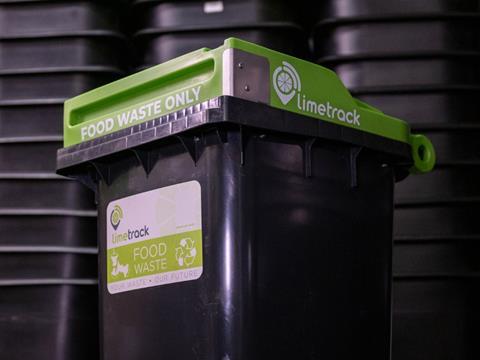
London-based food waste technology company Limetrack has revealed it has raised over €1 million to scale production and deployment of its Smart bins, designed to automatically weigh and report waste and carbon emissions.
The bins aim to help businesses cut costs, reduce carbon and meet regulatory requirements, such as the new Simpler Recycling laws which came into force in the UK in March 2025 for businesses with over 10 employees. Smaller businesses are due to be mandated under the same rules from April 2027.
The new funds were raised through a combination of a £1 million loan from Government-sponsored Innovate UK and £320,000 in equity from backers including waste industry corporates, an impact VC fund and angel investors. The funds are expected to enable the business to fulfil existing orders and pre-orders, with a pipeline of over 5,700 units for 2026.
The investment will specifically target the development of a high-volume design, aiming to increase manufacturing from 20 Smart bins a week to 250 a week within the next 10-12 months. Limetrack states that this will require platform enhancements such as advancing its intellectual property portfolio, supporting harmonized UK and EU certification and high-volume production tooling and funding team expansion across engineering, operations and customer delivery to support rapid rollouts.
Limetrack says current customers of its patented Internet-of-Things (IoT)-enabled food waste bin include NHS Trusts, independent schools, office blocks, restaurants, hotels and care homes, as well as all major UK waste management firms. Multinational corporations including Sky and global hospitality company Convene are introducing Limetrack’s Smart bins across multiple sites.
Earlier this year, Reusables.com reported that its RFID-enabled, zero-deposit reuse system was supplying reusable foodservice containers and smart return bins to university campuses, offices, hospitals, and other institutions in hopes of reducing single-use waste and streamlining operational costs. By scanning their credit card, student card, or employee card on a checkout device at point-of-sale, consumers can assign a reusable pack to their ID without additional sign-ups.
As part of our Packaging Europe podcast series, we spoke to Esson Akolo of Tomato Jos - winner of last year’s SAVE FOOD project competition – which aims to reduce the amount of food waste from Nigeria’s tomato harvest. The agricultural processing company works at the intersection of agriculture, logistics and packaging, supporting smallholder farmers and refining supply chain processes through modern technology, improved transport packaging and education programmes.
If you liked this story, you might also enjoy:
The ultimate guide to the Packaging and Packaging Waste Regulation in 2025
How are the top brands progressing on packaging sustainability?
Everything you need to know about global packaging sustainability regulation in 2025
The key to increasing the use of reusable packaging in supermarkets














No comments yet